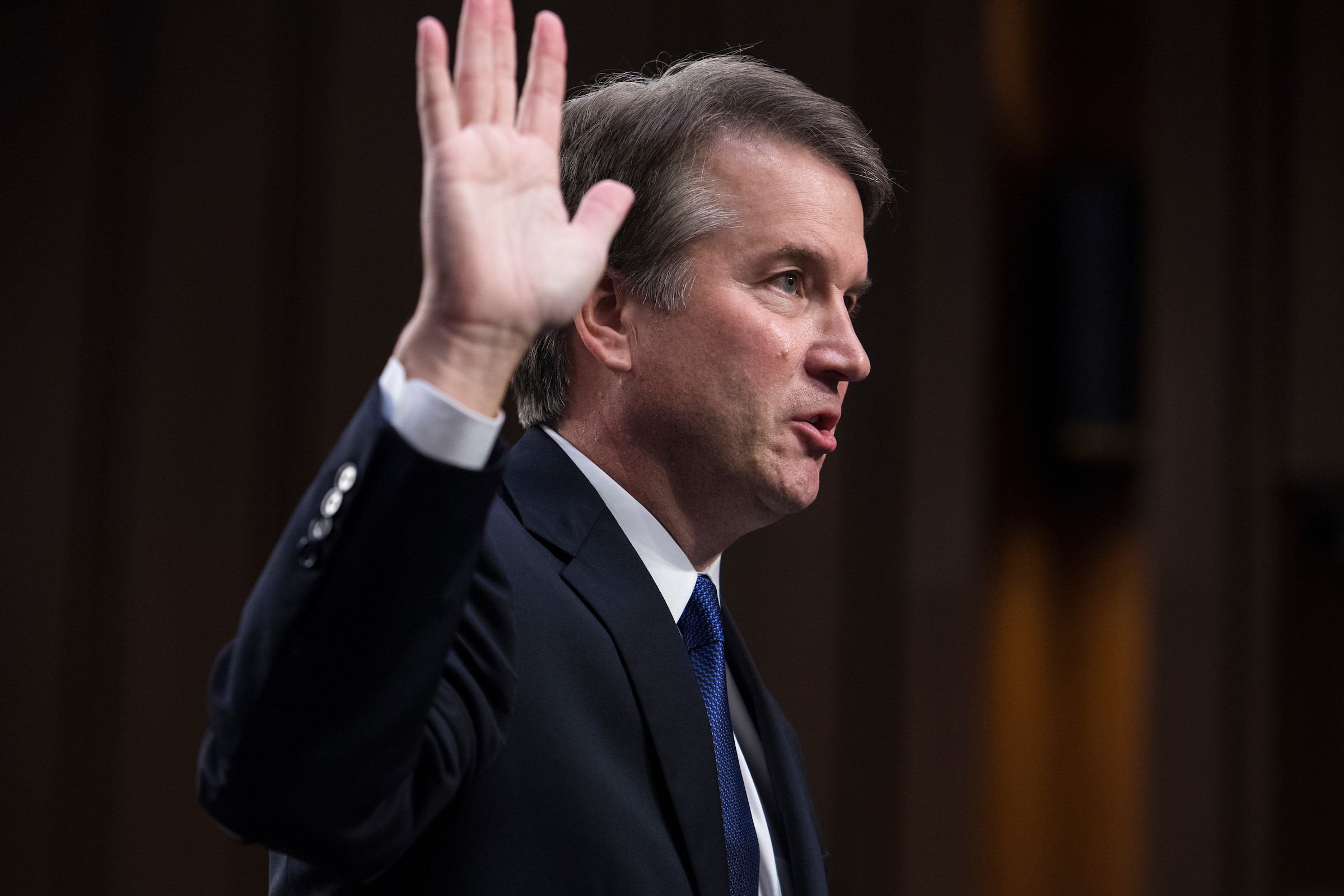Kavanaugh Is Already Reshaping the Supreme Court
As Trump’s pick defends himself, justices will meet behind closed doors

On the same day the Senate Judiciary Committee plans a televised hearing on a sexual assault allegation against Supreme Court nominee Brett Kavanaugh, the eight current members of the high court will meet behind closed doors to discuss which new cases to hear.
The confluence of those events set for Monday underscores how the high-profile political fight over Kavanaugh’s nomination will also color the public perception of the Supreme Court, and could prompt the justices to steer clear of more controversial cases in the coming term that starts in October.
“Depending on what happens with the rest of the confirmation process, the court might feel kind of battered and that it needs to take things more slowly,” said Nicole Saharsky, a partner at Gibson, Dunn & Crutcher who has argued 29 cases before the Supreme Court.
Watch: Hirono on Kavanaugh Accusation — Men Need to ‘Shut Up and Step Up’
The Supreme Court will meet Monday for a “long” conference, where justices review hundreds of petitions and choose just a few to hear arguments from and decide before the end of the term in late June. The question is whether they will “look at that list and say, ‘Bring it on, I want to take all the hot-button issues,’” Saharsky said during a panel discussion Monday at Georgetown University Law Center.
“You imagine you’re getting a new colleague, and it’s been a pretty hard-fought, difficult process, that they might see some of these cases — even if there’s a circuit split and even if it’s a really interesting issue — and just think, we can wait,” Saharsky said.
The court doesn’t have a choice but to take certain cases, such as challenges to congressional maps as partisan gerrymanders that are directly appealed to the high court, Kannon Shanmugam, who heads up the Supreme Court practice at Williams & Connolly, said during the Georgetown panel. Otherwise, it takes four justices to agree to take up a case for it to be put on the court’s docket.
“I wouldn’t be surprised if the court at least wants to have a little breathing space after the conclusion of this confirmation process,” Shanmugam said. “It’s been really striking the extent to which justices from across the jurisprudential spectrum have, during this confirmation process, expressed their concern about the confirmation process more generally, have expressed their regret that the confirmation process is not what it once was.”
[Kavanaugh ‘Anxious’ to Testify, Trump Says]
Justice Ruth Bader Ginsburg, after the Kavanaugh confirmation hearings but before Christine Blasey Ford accused the nominee of sexually assaulting her while in high school, characterized today’s Senate confirmation process as “wrong.”
Ginsburg, at an appearance Sept. 12 at George Washington University Law School, noted that the vote on her confirmation in 1993 was 96-3 even though she had spent 10 years litigating cases for the American Civil Liberties Union.
“That’s the way it should be, instead of what it’s become, which is a highly partisan show,” Ginsburg said. “The Republicans move in lockstep, so do the Democrats. I wish I could wave a magic wand and have it go back to the way it was.”
In July, Justice Elena Kagan said at an event with University of Chicago interns that the partisan confirmation process makes the Supreme Court justices look like “junior varsity politicians,” CNN reported.
“There is so much tit-for-tat for tit-for-tat that goes on in these processes,” Kagan said. “Everybody has their list of times that they’ve been wronged. The Republicans have their list and the Democrats have their list.”
[Republicans Face Critical Moment With Kavanaugh]
Kavanaugh, who has been a reliably conservative judge on the federal appeals court in Washington for the past dozen years, would solidify the conservative tilt of the court. He would fill the seat of Justice Anthony Kennedy, who stepped down from the court in July after 30 years and was conservative but joined liberals on issues such as access to abortion, affirmative action and LGBT rights.
The court’s last term, which ended in June, had numerous high-profile cases. This term, the justices start without any blockbuster cases on their docket, said Irv Gornstein, the executive director of Georgetown’s Supreme Court Institute.
There are some potentially big cases at the lower courts that could reach the Supreme Court later, Gornstein said. Concerns about the court being viewed as too partisan could enter into the justices’ decisions about which of those to hear, particularly on abortion, he added.
Gornstein said a “big strain” in Chief Justice John G. Roberts’ thinking is that if the justices produce one 5-4 decision after another, with Republican appointees in the five and Democratic appointees in the four, “the country at large will no longer view the Supreme Court as it does now.”
“I think this is an outcome he fears almost more than any other,” Gornstein said.
The next justice could provide the fourth vote for conservatives to take contentious cases, he said, but Roberts will seek a slower pace.
“For me the key question is whether the new justice is going to be susceptible to the chief’s influence at all on whether to keep some of these hot-button issues away from the court,” Gornstein said.
The uncertainty around Kavanaugh’s confirmation, and how long the court could be stuck shorthanded at eight justices, could also affect the types of cases the justices agree to hear.
Schumer: ‘Professor Ford Is Telling the Truth,’ Calls for Full Hearing ‘Done Right’





